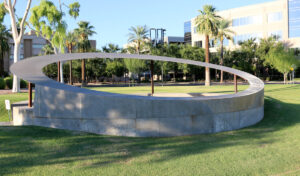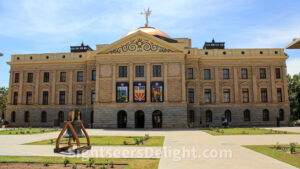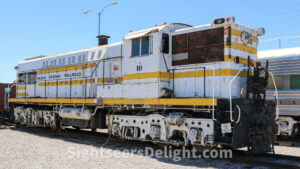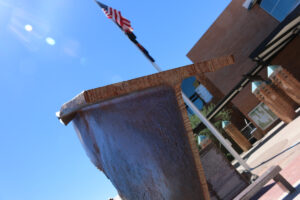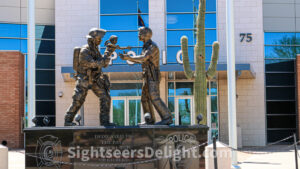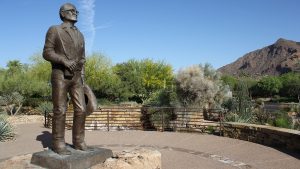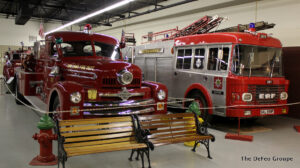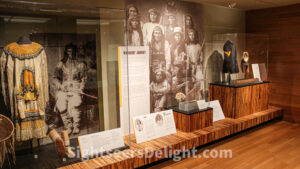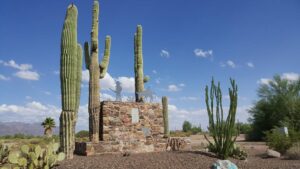Located at the Wesley Bolin Memorial Plaza near the State Capitol in Phoenix, the 9/11 Memorial in Arizona was unveiled on Sept. 11, 2006. The memorial is often — and perhaps best — described as a circular plan with a flat inclined metal ring. The memorial opened to some controversy. The controversy centered on a number of quotes engraved into the ring, including “Congress Questions Why CIA and FBI Didn’t Prevent Attacks” and “You Don’t Win Battles of Terrorism With More Battles.”
Inside the Arizona State Capitol building, which was built in 1901 and predates Arizona’s 1912 entry into the Union as a state, the story of The Grand Canyon State comes to life. Displays include the silver and copper punchbowl service from the USS Arizona, said to be the only one of its kind. it is composed of etched copper panels depicting desert scenes set into a silver bowl ornamented with mermaids, dolphins, waves, and other nautical themes. In addition, the museum also displays a collection of gifts received by Arizona as part of the Merci Train sent by France to the United States following World War II. Outside, the Wesley Bolin Memorial Plaza on the Phoenix state capitol grounds are filled with an impressive collection of monuments, including one to the Navajo Code Talkers of World War II.
85007
Since 1983, the Arizona Railway Museum has been dedicated to preserving and interpreting the state’s railroad history. The museum moved to its current location at the southwestern edge of Tumbleweed Park since 2006. Two items in its collection are listed in the National Register of Historic Places. They are Southern Pacific Railroad Locomotive No. SP 2562 (and Tender No. 8365) and Railroad Steam Wrecking Crane and Tool Car.
85249
The 140-acre Desert Botanical Garden was established in 1939 and is home to more than 21,000 flowers. Plants are on display along five thematic trails that cover a range of topics, including conservation, desert living and people of the Sonoran Desert.
85008
The Gilbert 9/11 Memorial features an 8-foot steel girder beam that once held up the North Tower of the World Trade Center. Gilbert Fire Chief Collin DeWitt and Assistant Fire Chief Jim Jobusch drove to New York City to personally collect the beam, then gave it the same honorable and respectful ride home they would give to a fallen soldier. Before it was installed at the memorial, the beam traveled through town so residents could see, touch and learn about it. The memorial was designed and built in four months. It also features four granite walls with the names of those lost in the attacks.
85296
The Gilbert Public Safety Memorial was dedicated on April 30, 2007. Tempe Firefighter Steven Schneider designed the memorial. The police officer is a likeness of Rob Targosz, who was killed in the line of duty on April 30, 2006, by a drunken driver.
85296
In 2004, the hometown of “Mr. Conservative” Barry Goldwater unveiled a statue of its most famous resident. Sculpted by Arizona artist Joe Beeler, the statue stands one-and-a-half times taller than Goldwater did in life. Located on a busy corner in the heart of Paradize Valley, Ariz., Goldwater’s likeness stands in the shadow of his former home. The monument is surrounded by neatly landscaped terrain featuring a plethora of local flora. An avid ham radio operator, Goldwater is perhaps best remembered for helping rekindle the conservative movement during the 1960s, publishing the acclaimed “The Conscience of a Conservative” in 1960.
85253
The National Historical Fire Foundation is better know as the Hall of Flame. The museum is dedicated to preserving firefighting equipment used in Arizona and around the world. The museum has five exhibit bays and the National Firefighting Hall of Heroes gallery. The equipment is grouped as: Hand & Horse Drawn (1725–1908); Motorized Apparatus (1897–1948); Motorized Apparatus (1918–1968); Motorized Apparatus (1919–1950) and Wildland Firefighting. It has also have a large collection of Fire Department arm patches.
85008
The story of Arizona would be far from complete without the Native American perspective. While it is at times a difficult story to tell and a difficult story to hear, the Heard Museum does a magnificent job brining the Native American Experience to life. Dwight B. and Maie Bartlett Heard founded the museum in 1929 to house their personal art collection. Today, the 130,000-square-foot museum features more than 40,000 items in its collection, including the Barry Goldwater collection of Hopi kachina dolls.
85004
Jacob Waltz could be called the ultimate wanderlust. According to legend, he discovered a great gold mine somewhere in the hills around Apache Junction, but the precise location was lost to history after he died in 1891. A monument in Apache Junction helps keep his story and the legend of the Lost Dutchman alive.
85120

